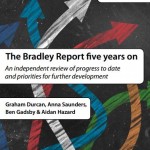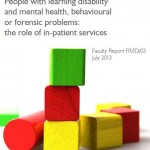
Tom Crossland looks at the findings of a review of the literature regarding women with learning disabilities and forensic needs
[read the full story...]
Tom Crossland looks at the findings of a review of the literature regarding women with learning disabilities and forensic needs
[read the full story...]
Five years ago, Lord Bradley published his report looking at the situation of people with mental health problems and people with learning disabilities in the criminal justice system. The Bradley report made a number of recommendations and this summer sees the publication of a progress report on these recommendations. The Bradley commission, established as an [read the full story…]

The majority of the studies relating to alcohol use by people with learning disabilities have shown that this is lower than in the general population. Studies have tended to focus on issues of misuse however, although we did post about an article a couple of years back in 2012 where the author raised a question [read the full story…]

The use of restrictive interventions should always be as a ‘last resort’ and always in the context of a clear and agreed individualised plan of support. However, the events at Winterbourne View suggested that not only was this not always the case, but that in fact these approaches were sometimes being used to humiliate or [read the full story…]

Background As far back as 1992, the Reed Report into the care of mentally disordered offenders identified the need for close working between the Police, Health and Social Services and set out some clear principles for offenders with learning disabilities which called for a individually tailored approach with care and treatment provided in the community, [read the full story…]

Background We know that people with learning disabilities in the criminal justice system can be especially vulnerable, and the recent Bradley report highlighted a number of approaches that could be taken to prevent this vulnerable group being caught in the revolving door of the criminal justice system. It is unclear however how many people with [read the full story…]

Background Published research in the last few years has shed some light on the experiences of people with learning disabilities in the criminal justice system, with significant evidence emerging of their vulnerability. The authors of this current study however, were interested in the ways in which people might, or might not, become involved in the [read the full story…]

Criminology has used strain theory as a way of looking at how certain social structures within a society may produce pressure on citizens to commit crime, identifying strain as either structural, e.g. processed at the societal level ,or individual referring to difficulties experienced in moving towards satisfying needs There has been little attempt to use [read the full story…]

The 2009 Bradley Review espoused a new approach to dealing with mentally ill offenders and those with learning disabilities to prevent this vulnerable group being caught in the revolving door of the criminal justice system. One of the recommendations was to develop awareness training for criminal justice staff and members of the judiciary to help [read the full story…]

In the wake of the dreadful events at Winterbourne view and the subsequent inquiries and reports, there is now a real push to consider the place of inpatient services for people with learning disabilities who present with complex needs and behavioural challenges. We have posted recently about alternatives to inpatient services, for example the Association [read the full story…]